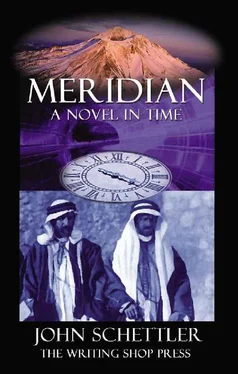John Schettler - Meridian
Здесь есть возможность читать онлайн «John Schettler - Meridian» весь текст электронной книги совершенно бесплатно (целиком полную версию без сокращений). В некоторых случаях можно слушать аудио, скачать через торрент в формате fb2 и присутствует краткое содержание. Год выпуска: 2002, ISBN: 2002, Издательство: The Writing Shop Press, Жанр: Фантастика и фэнтези, на английском языке. Описание произведения, (предисловие) а так же отзывы посетителей доступны на портале библиотеки ЛибКат.
- Название:Meridian
- Автор:
- Издательство:The Writing Shop Press
- Жанр:
- Год:2002
- ISBN:0-9713170-1-1
- Рейтинг книги:4 / 5. Голосов: 1
-
Избранное:Добавить в избранное
- Отзывы:
-
Ваша оценка:
- 80
- 1
- 2
- 3
- 4
- 5
Meridian: краткое содержание, описание и аннотация
Предлагаем к чтению аннотацию, описание, краткое содержание или предисловие (зависит от того, что написал сам автор книги «Meridian»). Если вы не нашли необходимую информацию о книге — напишите в комментариях, мы постараемся отыскать её.
As the project team meets for their final mission briefing, the last member, arriving late, brings startling news. Catastrophe threatens and the fate of the Western World hangs in the balance. But a visitor from another time arrives bearing clues that will carry the hope of countless generations yet to be born. Meridian is an intelligent, compelling, fast paced story that is impossible to put down.
Meridian — читать онлайн бесплатно полную книгу (весь текст) целиком
Ниже представлен текст книги, разбитый по страницам. Система сохранения места последней прочитанной страницы, позволяет с удобством читать онлайн бесплатно книгу «Meridian», без необходимости каждый раз заново искать на чём Вы остановились. Поставьте закладку, и сможете в любой момент перейти на страницу, на которой закончили чтение.
Интервал:
Закладка:
“What?” Dorland was preoccupied with his notebook. “It’s over by the sink.”
“Good,” said Maeve, her hazel eyes flashing as she reached out and snatched away Paul’s pen to interrupt his scribbling. “Go make some.”
Paul started to protest, but one look at Maeve quashed that idea. She had signed on two years ago with the history team to chart potential outcomes and consequences for the experiment. A slim woman in her middle thirties, she had a no-nonsense manner about her, a penchant for cleanliness, schedules and an almost maniacal insistence for structure in the way she ordered her work. She had been a key research leader for the Outcomes Committee, and the considerable force she was able to exert on the group mechanics had soon demonstrated that she was not a person to be trifled with. She smoothed back a lock of her reddish blond hair and fixed Paul with the same patented stare that had cowed the wayward elements of the Outcomes Committee. “Now.” The single word added just enough emphasis to set Paul in motion.
“Alright,” he offered a meek defense. “I’ll make another pot. Just give me a second here.” He reached for his Styrofoam cup as he retreated to the coffee station.
“Better hurry,” jibed Nordhausen, “the visitors could show up any moment. If they get here and find the hospitality lacking they might just pack up and leave.” The sarcasm in his voice was laced with just enough humor to soften its sting.
“Very funny,” said Maeve. “No doubt the mess in this place would be reason enough to send them on their way.” Nordhausen shuffled off to the bookcase as though he wanted to see just how bad it was before he dared to say anything. He thought his argument with Dorland offered better prospects, however, and returned to the coffee station while Paul ground a bowl of fresh coffee beans he had poured from a dark brown bag. The noise of the grinder imposed a moment of silence on the conversation, but Paul started right in when he was done.
“Your problem is that you are just too wedded to your own subject, Robert.” He tilted the coffee grinder on its side and tapped the contents of the bowl into the protective lid.
“What’s that supposed to mean?” Nordhausen was quick to defend himself, and Maeve smiled to herself as the two men warmed up the argument again.
“I mean you love your history so much that you simply can’t bear the thought that anyone could go back and ‘muck it up’ as you are fond of saying.” He was rinsing out a coffee press and wiping it down with a paper towel. The aroma of fresh ground coffee was already thick on the air as he worked.
“Well someone ought to be concerned enough about it to put in a good word or two for history’s sake—don’t you think? Can you imagine the potential nightmares we could have if this thing actually works? What if someone botched up the continuum and we end up losing Shakespeare, or Milton or Da Vinci?”
“We’re the only ones who would know about it,” said Dorland falling back on his inscrutable theory again. “Once the continuum changes, all trace of the altered past is gone forever. If Shakespeare ended up dead before he ever started writing, then no one would ever know about it—unless they were in the Nexus Point where the Meridian was altered.”
“Oh they’d know,” Nordhausen countered. “They’d know in their gut. There would be an immense hole in the entire progression of Western thought and expression that would leave us all the more impoverished. And if this be error upon me proved—” he began to quote one of the sonnets, and Maeve quipped in the finishing line for him.
“Then I never writ, and no man ever loved.” She was secretly delighted with the discussion, for it was just the sort of temporal conundrum that she so enjoyed sorting through. While her primary academic interest had been in Byzantine History, she was very well read and could hold her own in a discussion on almost any subject involving history, literature, and the other liberal arts. But the real reason she had been selected from among the thousands of applicants for the project was the incredible analytical ability she seemed to have. Her scores on the outcome variable testing were right at the top of the list, and she could back up each and every answer she gave with a hundred references and logical arguments. “That’s why I’m here, Robert,” she continued. “Don’t worry. It’s my job to be certain no one does drown Shakespeare before his time, and I can assure you that Hamlet and Othello have nothing to fear.”
Nordhausen smiled at her, convinced that she meant exactly what she said. Maeve Lindford would set a guard on the hallowed halls of history like no one else. It was precisely her research on potential Outcomes and Consequences that would stand that watch, and a sudden thought occurred to him.
“There you go, Paul,” he angled over to Dorland where he was impatiently waiting on a simmering water kettle. “Why not put Outcomes in charge of the operational phase of the project? Good Maeve here would be a formidable defender for us both, don’t you think? You theoreticians set up the equipment and parameters, and the historians will find you that needle in the haystack of time you’ll be wanting to get at. But we need someone like Maeve to knock our heads together when we can’t agree on what we should do. Outcomes and Consequences—Isn’t that what it’s really all about in the first place? Let Maeve’s committee exercise final authority on the operation and keep Shakespeare and Milton sleeping comfortably in their graves.”
“Here, here!” Maeve smiled at the thought of knocking a few heads together, and she knew exactly where she might begin.
The whine of the water kettle interposed itself and Paul quickly rescued it from the electric burner, pouring the hot steamy water into the coffee press. The aroma of the coffee redoubled. He was already looking for his Styrofoam cup to pour in his favorite creamer, a blend of powdered Carnation milk with a hint of hazelnut.
Maeve shot him a disapproving glance as he heaped the powder into his cup. “I can smell that way over here,” she said with an edge of complaint in her voice.
“What?” said Dorland as he stirred the coffee in the press with a long-handled spoon. “You mean my precious powders?”
“Whatever,” said Maeve with a half smile. “Are you sure you really like coffee? Why don’t you just mix up a batch of hot water with that stuff and enjoy your hazelnut.”
Nordhausen was quick to take her side. “I’ve always said that most of Paul’s problems can be attributed to an excess of hazelnut in his coffee.” They laughed together, the mood lightening a bit as Paul began pressing the coffee.
“Seriously,” said Dorland, trying to tack back to the heart of the discussion. “This gets at the crux of the matter, doesn’t it?” He filled his Styrofoam cup and Nordhausen watched the creamer billow up as he poured. “Now, the way I see it, the Old Bard would have to be a Prime Mover all on his own. He simply influenced too many lives with his writing to be so easily erased from the time continuum. I mean, anyone who has ever read the man seriously could not help but be changed by his poetry and plays in some way. Shakespeare is a perfect example of my theory on Primes. He’s just too damn important to be shunted aside, and history will do everything possible to see that it could never happen. A little help from Maeve in the bargain would be all the assurance you need, my dear Professor. See what I mean? Prime Movers cast a kind of protective shadow on the time line. They aren’t easy to derail.”
“Here we go. He’s going to give us that penumbra nonsense again,” Nordhausen complained.
“Well think about it, will you?” Dorland took a sip from his cup and extended the pot to Nordhausen as he spoke, filling the other man’s mug with the rich, black coffee. “You’re the man who is so adamant about protecting our cherished past. Perhaps the time continuum has a way of protecting its own, if you will. A man like Shakespeare or Milton is simply too important to the progression of Western culture to be lightly tampered with. Isn’t that why we picked Shakespeare for our first target? So, the continuum surrounds such a man with a protective aura of some kind. Such men stand so tall in the course of history that they cast a deep shadow about them once they first give birth to a work of art or science or whatever it is they do to become so important to the future. The shadow deepens as their influence on other lives grows and changes the progression of the time line. It soon reaches a point where their influence is so great, where they have altered so many individual lives, that it cannot be undone. The shadow they cast on history is so deep that it simply cannot be penetrated—That’s the penumbra surrounding the Prime Mover and insuring the Imperative such a person or event must give rise to. Shakespeare must write Hamlet, Othello, The Tempest and all the rest. ”
Читать дальшеИнтервал:
Закладка:
Похожие книги на «Meridian»
Представляем Вашему вниманию похожие книги на «Meridian» списком для выбора. Мы отобрали схожую по названию и смыслу литературу в надежде предоставить читателям больше вариантов отыскать новые, интересные, ещё непрочитанные произведения.
Обсуждение, отзывы о книге «Meridian» и просто собственные мнения читателей. Оставьте ваши комментарии, напишите, что Вы думаете о произведении, его смысле или главных героях. Укажите что конкретно понравилось, а что нет, и почему Вы так считаете.












